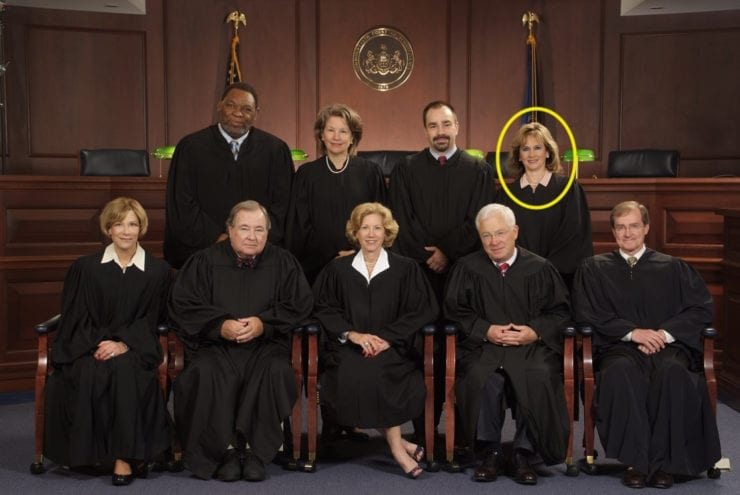A Pennsylvania appeals court judge ordered state officials on Wednesday to halt any further steps toward certifying election results, a day after Gov. Tom Wolf said he had certified Democrat Joe Biden as the winner of the presidential election in Pennsylvania.
Wolf’s administration quickly asked the state Supreme Court to block the ruling from taking effect, saying there was no “conceivable justification” for it.
“Since the birth of our nation nearly 250 years ago, no court has ever issued an order purporting to interfere with a state’s ascertainment of its presidential electors – until today,” the administration said in its motion.
Commonwealth Court Judge Patricia McCullough, a Republican, had issued the order and set a hearing for Friday. It wasn’t immediately clear if she intended to hold up the certification of state and local contests on the ballot or interrupt the scheduled Dec. 14 meeting of the state’s 20 electors.
She came back with more good news or Trump’s legal team as late in the night, Judge Patricia A. McCullough ruled that PA preliminary ELECTION CERTIFICATION injunction was PROPERLY ISSUED and should be upheld and that gives state legislators power to choose electors.
She issued a HUGELY favorable opinion
Of Note:
– Commonwealth barred from taking ANY further steps to certify results
– Issues raised found to be of “statewide and National concern”
-“likelihood to succeed on the merits”
“Additionally, Petitioners appear to have established a
likelihood to succeed.”
so:
“..the Court respectfully submits that the emergency preliminary injunction was properly issued and should be upheld pending an expedited emergency evidentiary hearing
From the memorandum:
“Petitioners appear to have established a likelihood to succeed on the merits because Petitioners have asserted the Constitution does not provide a mechanism for the legislature to allow for expansion of absentee voting without a constitutional amendment.”
The petitioners in the case are Mike Kelly, Sean Parnell, Thomas A. Frank, Nancy Kierzek, Derek Magee, Robin Sauter, Michael Kincaid, and Wanda Logan.
Legal Insurrection – A Pennsylvania state court judge has issued a preliminary injunction preventing Pennsylvania from taking any further steps to perfect its certification of the election, including but not limited to appointment of electors and transmission of necessary paperwork to the Electoral College, pending further court hearings and rulings. The ruling upholds an injunction from earlier in the week and is significant because of the findings made in the Opinion released tonight.
The case has been somewhat under the radar because it doesn’t involve claims of fraud. It appears to be a pretty straight legal argument. This is not the federal court case that has received a lot of press attention and in which the Third Circuit Court of Appeals denied relief.
The issue, in this case, is whether legislative expansion of absentee balloting to broad mail-in balloting violated the Pennsylvania Constitution. It’s not clear what the relief would be; the petitioners seek to preclude the Secretary of State from transmitting the certification or otherwise perfecting the electoral college selections.
The Judge issued this Opinion to extend that halt pending further hearings, and to set forth the basis for the injunction, which could be relevant to the appeal:
Additionally, Petitioners appear to have established a likelihood to succeed on the merits because Petitioners have asserted the Constitution does not provide a mechanism for the legislature to allow for expansion of absentee voting without a constitutional amendment. Petitioners appear to have a viable claim that the mail-in ballot procedures set forth in Act 77 contravene Pa. Const. Article VII Section 14 as the plain language of that constitutional provision is at odds with the mail-in provisions of Act 77. Since this presents an issue of law which has already been thoroughly briefed by the parties, this Court can state that Petitioners have a likelihood of success on the merits of its Pennsylvania Constitutional claim.
The Judge found, among other things, that the plaintiffs were likely to prevail on their PA constitutional claims, and that the matter was not moot even though PA had “certified” the results, because there were more steps to be taken [emphasis added].
Judge McCullough concluded: This is not a final ruling on the merits. It’s meant to prevent PA from taking more steps until the court finally rules.
Given how the PA Supreme Court has ruled previously on election matters, expanding procedures beyond what even the legislature adopted, I don’t see how this survives the PA Supreme Court. From there, the next stop is the U.S. Supreme Court where we know John Roberts and the three liberal Justice will defer to the state supreme court. But the Court is now 6-3, so a Roberts defection would not result in a 4-4 deadlock again if the 5 conservative Justices voted together.
Here is a copy of Friday night’s ruling.
Memorandum Opinion Filed in… by Jim Hoft
A link if you wish to download the memorandum:
People shared their opinion online:
In any case, if any of you wonder what is memorandum opinion here’s your explanation:
Under United States legal practice, a memorandum opinion is usually unpublished and cannot be cited as precedent. It is formally defined as: “[a] unanimous appellate opinion that succinctly states the decision of the court; an opinion that briefly reports the court’s conclusion, usu. without elaboration because the decision follows a well-established legal principle or does not relate to any point of law.”
Generally, memorandum opinions follow ordinary rules, including the application of precedent and the rule of stare decisis.
Pennsylvania Judge Patricia A. McCullough:

I believe the US Constitution specifies that the state legislature shall set the method and means of choosing the electors, quite independent of what any judge may decree.


